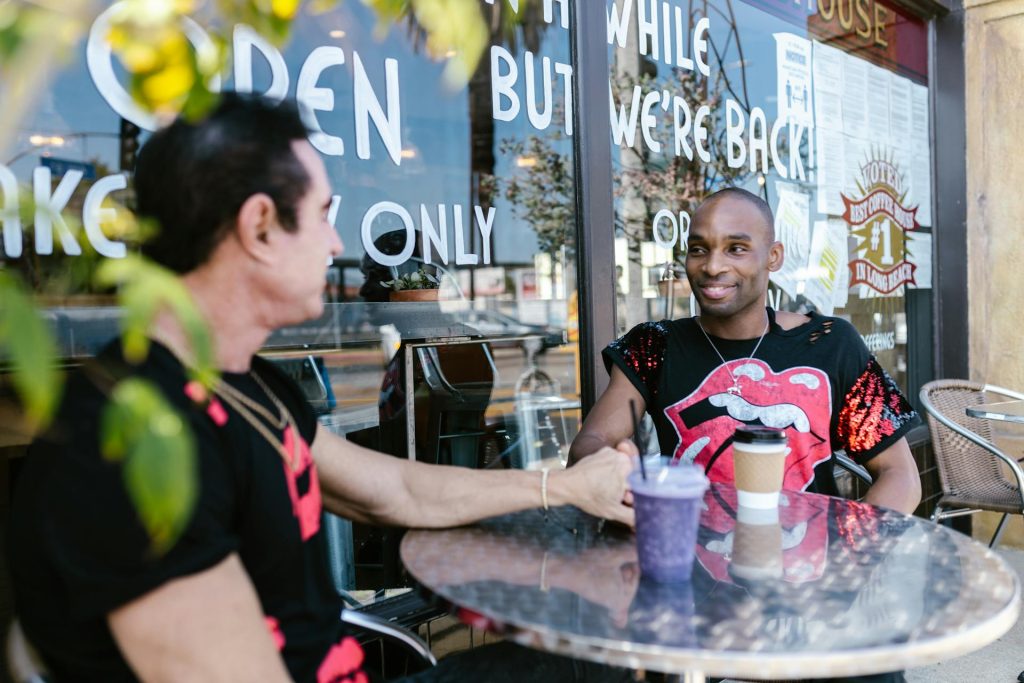You’re middle-aged, you’re out for the first time in your life, and you’re looking for love (or companionship, or friends with benefits – we’re not here to judge). Do you know LGBTQ+ dating terms?
If you haven’t dated queer before – or even if you just haven’t dated in a long time – you’ve probably noticed that people on the apps use a lot of terms that might be unfamiliar.
It doesn’t help that younger people keep coming up with new words. (Hey, I was there when they named “pegging”! I’ve been around.)
Welcome to LGBTQ+ Dating!
Don’t feel bad, don’t despair, and don’t dare call yourself too old! Queer dating apps and spaces can sometimes feel like learning a new language, but that’s why Midlife Queer is here to break it down for you.
Below are some common sex and dating terms you’ll likely come across. Knowing what they mean can help you feel more confident while navigating the scene, and may even save you from an awkward encounter or two!
NOTE: This list is just getting started. We’ll continue expanding and adding more content specific to lesbian, gay male, trans, and other LGBTQ experiences too!
Common LGBTQ Dating Terms
1. Top, Bottom, Versatile (or Vers)
These terms refer to roles during sex, particularly in the context of same-sex encounters, although they can apply more broadly.
- Top: The partner who is more active or dominant, typically the one who penetrates during sex.
- Bottom: The partner who is more passive or submissive, typically the one being penetrated.
- Vers/Switch: Someone who is comfortable in both the top and bottom roles.

2. Cisgender (Cis)
A person whose gender identity matches the sex they were assigned at birth. For example, a cis man is someone who was assigned male at birth and identifies as male.
3. Non-binary (NB or Enby)
A term for people who don’t identify exclusively as male or female. They may feel like a mix of both, neither, or something else entirely.
4. Femme/Masc (Feminine/Masculine)
These terms are used to describe gender expression—how someone presents themselves to the world. Femme refers to a more traditionally feminine appearance, while masc refers to a more traditionally masculine one.
5. DTF (Down to Fuck)
A casual term used on dating apps to indicate someone is looking for a sexual encounter, often with little expectation of emotional connection or long-term commitment.
6. NSA (No Strings Attached)
A term meaning someone is looking for casual sex without any commitments or relationship expectations. Similar to Friends with Benefits (FWB).
7. Queer
An umbrella term that includes people who identify outside of heterosexual and cisgender norms. It’s sometimes used to reject rigid labels around gender and sexuality. It can be a political identity as much as a sexual or gender identity.
8. Gender Non-Conforming (GNC)
Someone whose gender expression doesn’t align with traditional expectations of masculinity or femininity. They may present in ways that mix or reject those categories.
9. Poly or Polyamorous
Polyamory refers to having romantic or sexual relationships with more than one person at the same time, with the knowledge and consent of everyone involved. Polyamorous people may form relationships that look very different from traditional monogamy.
10. Cishet
This refers to people who are both cisgender and heterosexual—essentially people who aren’t LGBTQ+.
A Few Extra Tips for Navigating Dating Apps
- Don’t Guess – Ask: If you’re unsure what a term means, don’t hesitate to ask or look it up. It’s always better to clarify than to make assumptions.
- Set boundaries: Clearly communicating your comfort levels and boundaries is important in the queer dating world. Apps can sometimes be fast-paced, but you should feel empowered to move at your own speed.
- Stay safe: LGBTQ+ dating apps are like any other—some people are looking for love, others are just looking for fun. Make sure you meet for the first time in safe, public places, and be cautious about sharing personal information too quickly.
This guide should give you a strong foundation to understand the basics. The more time you spend in the community, the more comfortable you’ll become with the terms and language. Happy exploring, and remember, it’s all about being authentic to yourself!



